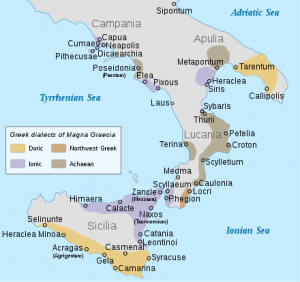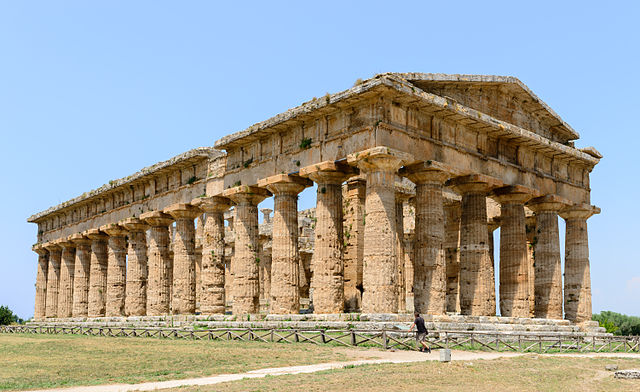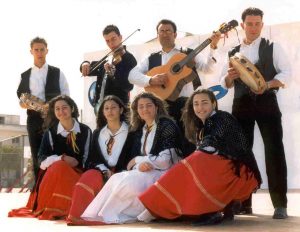Cosmos Philly profiles the few surviving Griko communities of the southern Italian region of Calabria. The Griko (sometimes spelled Greko) are the last remnants of thousands of years of Greek presence in Italy, and their language is now critically endangered.
Greeks first settled in Italy around the 9th century BC, when inhabitants of mainland Greece established colonies there. They have played an important role in Italian history, founding cities like Naples and Syracuse, and producing figures such as Archimedes.
Even the word “Greek” in Western European languages comes from the earliest Hellenic settlers in Italy: the Graecians were a tribe from mainland Greece that settled around modern Naples. The Romans applied the name for all Greeks, which was then used in most European languages. It was also adopted over time by Greeks living in Italy, with modern Calabrian Greeks calling themselves “Griko.”
Colonies and Conquests

The story of Greeks in Italy begins with competition among city-states towards the end of the Hellenic Dark Ages (11th-9th centuries BC). The soil of mainland Greece could not sustain its growing population, and rival city-states checked territorial expansion. Cities responded by establishing colonies, sending out expeditions to settle the Aegean islands, western Anatolia, the Black Sea, and southern Italy.
These colonies were incredibly valuable, since they both relieved the population pressure and exported grain to feed the mother city. Beyond that, they produced rare commodities that could not be found elsewhere in the Eastern Mediterranean. Ancient Greeks were a mercantile people, and competition among the city-states was fierce.
Many of these Italian colonies became powerful cities in their own right, and established colonies of their own on the mainland and on Sicily. This expansion continued up until the world-shaking expansion of the Roman Republic, swallowing up all of Italy and Sicily, followed soon thereafter by the entire Mediterranean world.

Roman rule was tolerant of the Greeks in Italy, and in some ways made things easier for them. Although Roman expansion made southern Italy increasingly Latinized, it also made communication among scattered Greeks much easier. Instead of a tangle of city-states and colonies, the Greek-speaking world was now integrated within the Roman imperium.
Periods of Isolation
The collapse of the Roman Empire in the west diminished communications between Italian Greeks and the motherland. For the first time in centuries, trade between the Eastern and Western Mediterranean declined, with a corresponding decline in travel between the two halves.

In 534, Justinian’s generals competed their reconquest of southern Italy and Sicily for the Byzantine Empire, reuniting the Greek-speaking world. Byzantine occupation lasted until 1071, during which time garrisons and civilians alike were settled throughout the region.
Following Constantinople’s loss of southern Italy, Greek communities there became once again isolated. This period lasted until the Ottoman Empire began its great conquests. As the Turks expanded into Greek lands, inhabitants fled to their compatriots in Italy. Exchange between the two groups continued during the centuries of Ottoman rule, but this was not
Over time, however, these Griko communities lost their contacts with Greece. Most Greek-speaking villages were assimilated into the predominant southern Italian culture, and lost their native language with it. Italian unification and nationalism in the 19th century encouraged the use of standard Italian over all regional dialects, which accelerated this trend. Only the most isolated mountain villages continued to speak Griko. Like little islands, they carried on ancient traditions lost even to modern Greeks—many aspects of Griko language and culture are seen as archaic.
Tracing the Source
Scholars debate the antiquity of the Griko people’s ancestry. Some maintain that it dates back to the earliest Greek settlements, while others argue the majority arrived much more recently.
One clue is the Griko language itself. It has characteristics both of Middle Byzantine Greek and of the ancient Doric dialect, which originated in the Peloponnese. At the very least, this suggests that the majority of the Griko’s ancestors arrived well before the Ottoman period.
It is quite possible that the dialects spoken by garrison soldiers during the Byzantine period had a strong influence on the local population. Constantinople had immense prestige throughout the Middle Ages, and exerted a cultural force disproportionate to its population. A small number of soldiers could have thus had a large effect on the language spoken by the much more numerous locals. If so, the Griko population truly has very ancient roots indeed.
Hopes for a Griko Revival

After many centuries of decline, natives of the last remaining Griko villages are trying to preserve their roots. With language often goes culture, which makes the preservation of Griko as a living tradition especially important.
The Cosmos Philly article notes how this is the centerpiece of Griko-revivalist efforts:
After spending time with the Squillaci family, I observed how passionate and hardworking they were in regards to the survival of their dying language. It was deeply moving and encouraging. With perhaps only one generation remaining of Greko speakers, Tito and Olimpia seem to be going full force with doing what they can to teach Greko and build awareness. In essence, they are guardians of Hellenism in this small region tucked away in the toe of the Italian peninsula. Although history and governments played a role in the decay of the language, culture, and identity of the Greko people in Calabria, Tito and Olimpia rightfully hold their people co-responsible for its status today. They need to want to learn Greko, even if it is not needed for practical reasons. The resources and tools are there. What will they do about it for the current generation and for generations to come?
The loss ancient tradition to the modern world can be heartbreaking. Whatever the ultimate fate of the Griko community, the work of present-day activists will help preserve the memory of a very different world. And if nothing else, it serves as inspiration for thousands of similar efforts elsewhere.
